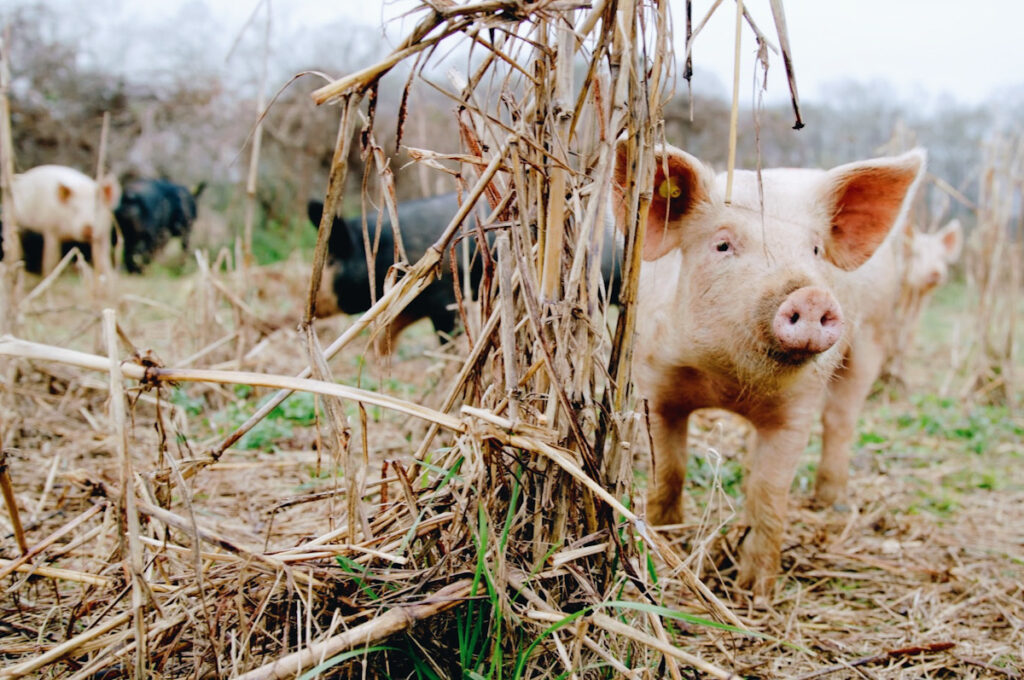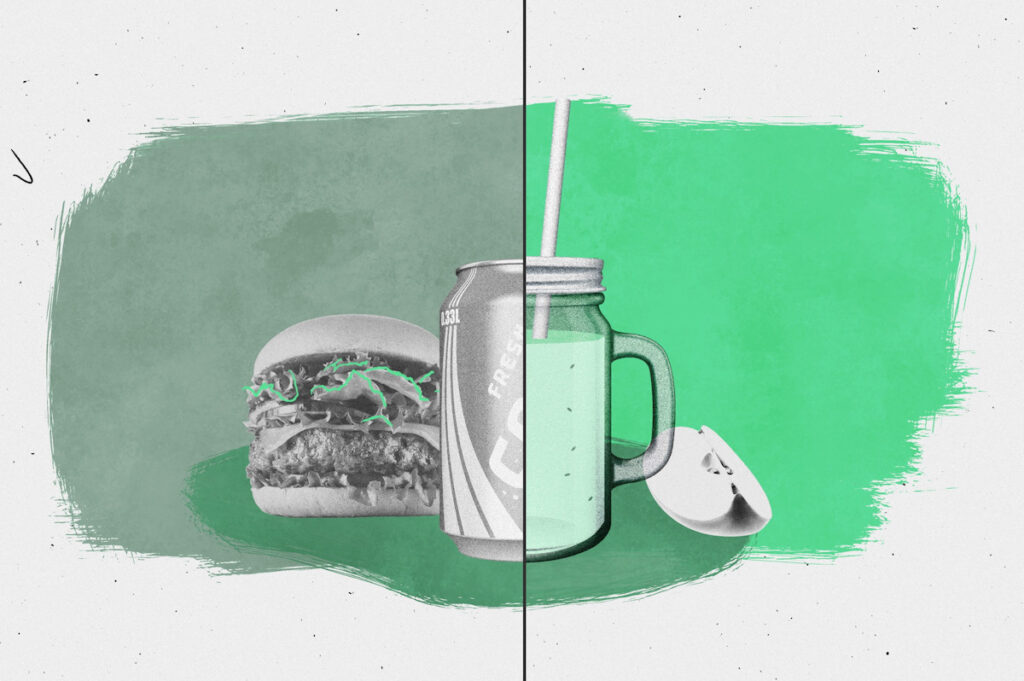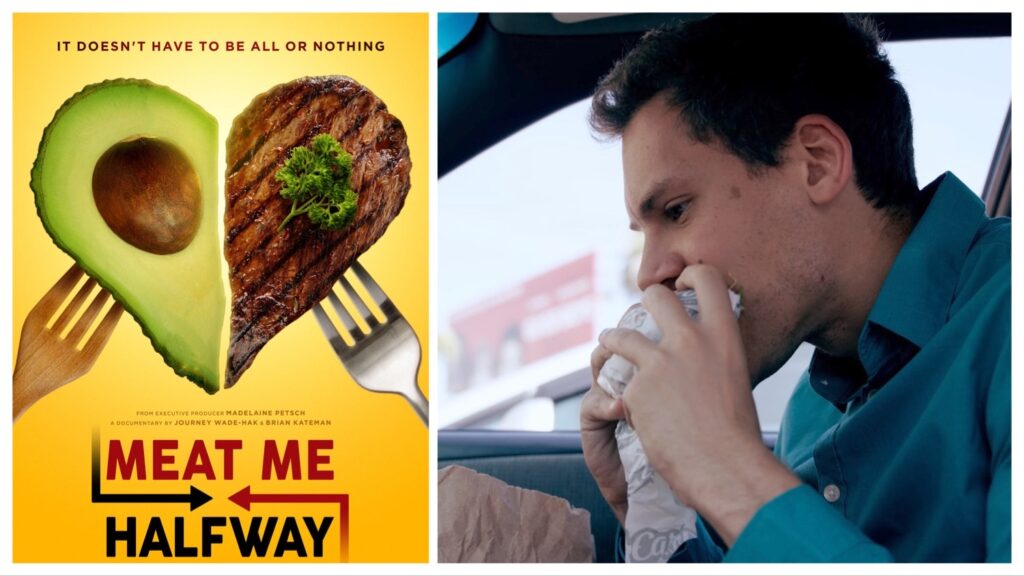A documentary called Meat Me Halfway explores the idea that one doesn’t need to go completely vegan in order to have a profound positive impact on themselves, animals, or the environment. Instead, Meat Me Halfway examines the notion that there is an approachable path for everyone to reduce their meat consumption in a variety of ways in order to protect the planet.
The documentary, available on iTunes, Amazon Prime, and a host of other streaming platforms, is produced, in part, by Brian Kateman, the leader of the Reducetarian movement, and Riverdale actress Madelaine Petsch.
While vegetarians eat no meat, and vegans consume no meat or animal products of any kind, reducetarians make a conscious effort to reduce their consumption of meat and animal products. Though omnivores and vegans alike take issue with this approach, Meat Me Halfway argues that getting meat-eaters to simply cut back (not cut out) the amount of meat they consume, is the key to weaning ourselves off of the factory farm system, which has a catastrophic impact on animal populations and the environment.
And though it might not seem like much, cutting back on your meat intake just a little can have a profound impact, especially over time. According to the Veganuary campaign, which encourages people around the globe to go vegan for the month of January, more than 580,000 people worldwide registered to take the pledge in 2021, and an estimated five million people gave vegan eating a try.
Though it is difficult to quantify the impact that a shift like that has on the planet, interest in Veganuary is rising steadily year over year, meaning more people are interested in giving veganism a go. As more people around the world embrace veganism, they’re more likely to make incremental changes in their own lives, even if they opt not to stick with the diet beyond January.
Furthermore, a study published in the journal Science in 2018 found that cutting meat and dairy products from your diet could reduce an individual’s carbon footprint from food by up to 73 percent. Additionally, the study found that if everyone stopped eating these foods, global farmland use could be reduced by 75 percent. In other words, it goes without saying that even incremental changes have the potential to be incredibly meaningful.

Brian Kateman on sustainability, meat consumption, and all-or-nothing thinking
In a world that is increasingly black and white, it’s encouraging to see a film that embraces small-yet-significant steps in the right direction and understands just how impactful they can be.
As Kateman puts it: “We’re so far away from any kind of utopia, no matter how you define it, that any change in the positive direction is one worth celebrating.”
We talked to Kateman about why he made Meat Me Halfway, what he’s super excited about when it comes to the alternative meat industry, and what he hopes viewers will take away from the film.
LIVEKINDLY: What inspired you to create Meat Me Halfway?
Brain Kateman: I really believe that folks need to cut back on the amount of animal products they consume. The average person in the United States, for example, eats well over 200 pounds of meat a year, and that’s a major problem in terms of many of the issues that I care about. [These include] everything from environmental challenges, climate change, biodiversity loss and deforestation, to issues around human health—diet-related illness, heart disease, certain types of cancer, diabetes, and obesity. And of course [I care about] the 9 billion land animals in the United States and 70 billion globally that are subjected to very cruel conditions in factory farms.
All those issues, in part, stem from our overconsumption of animal products. The question is, how do you reach the masses with education around why it’s a good idea to start including more fruits and vegetables in their diet? The film was really the natural next vehicle for us to communicate those ideas.
I think I entered the film asking the question: ‘Why is it so difficult to get people to eat less meat?’ because I’ve been asked this for nearly a decade. Meat consumption continues to go up, so I really wanted to center the film around trying to understand that honest question.

LIVEKINDLY: What does an ideal reducetarian look like to you? Is it someone who goes meat-free once a week, or for one meal a day?
Kateman: Being a reducetarian is about cutting back on animal products with respect to one’s current diet. My main goal is to get a person who is eating way too many animal products to cut back by even a small percentage. Of course the less the better, we want people to significantly reduce the amount of animal products in their diets, but even small changes in one’s diet matter a great deal, especially if a lot of people are making those changes together.
Vegans, vegetarians, and flexitarians are also reducetarians, it’s just that they have reduced their consumption of animal products quite significantly, and in some cases all the way to zero. But I’m not really that concerned about a person who’s eating a couple pounds of meat a year. My main focus is trying to encourage as many people as possible who are eating way too many animal products to cut back to the best of their ability.
LIVEKINDLY: There can be a lot of guilt and judgment within the vegan community in terms of level of commitment. It can sometimes feel like an all-or-nothing scenario. Do you worry that this can turn certain people off from trying to make changes, even if they’re smaller ones?
Kateman: I don’t believe in perfection as a general idea. In no area of my life am I perfect, I often fall short but I do the best I can, and I have a very similar view of diet. We should do the best we possibly can to be as kind to ourselves, the planet, and to animals, but we shouldn’t call ourselves ‘lazy vegetarians’ or ‘cheating vegans.’ We shouldn’t use language like that. We should celebrate people for doing the best that they possibly can, both because I think that’s intellectually valid and because I think it’s a much more effective way to advance that shared mission of reducing the societal consumption of animal products.

LIVEKINDLY: Why do you think people have a difficult time understanding and supporting the gray area of not giving up meat entirely but also not eating it at every meal?
Kateman: Our brains don’t do well with nuance or gray. We like clear answers, we like binaries, but the reality is that when we’re most intellectually honest and most compassionate, we are able to arrive at a place where we’re not embracing all-or-nothing thinking.
On the one hand, there are a lot of people who think that meat has to be at the center of every single meal, and that’s a problem because we don’t want people eating meat at the center of every meal. There’s lots of reasons [people think that.] There’s our evolutionary history, there’s marketing from industrial animal agriculture, and there’s over-processed food that we’ve been eating for so long that [our taste buds have changed.] There’s a lot of forces at play that enter into that all-or-nothing thinking on the side of the omnivore.
On the vegan side, while you can understand that a person objects to raising animals for food entirely, which I certainly can appreciate, they’re not necessarily going to be comfortable with a person eating a single ounce of meat a year when they know that the meat comes from an animal that was slaughtered.
But at the end of the day, it’s worth acknowledging just how dire the situation is. We’re so far away from any kind of utopia, no matter how you define it, that any change in the positive direction is one worth celebrating. We want to move away from that all-or-nothing thinking and allow people the flexibility to simply move in a more positive direction, even if it’s not as ideal as some people might want it to be.
LIVEKINDLY: One of the more moving parts of the documentary is when you attend a slaughter protest and see truckloads of pigs minutes before they’re killed. How did that experience change you?
Kateman: Anita [Krajnc, founder of Toronto Pig Save] told me that attending that pig vigil would turn me into an activist, and she was right. I was always passionate about the issues, and intellectually I understood what was at stake, but there was something very unique about witnessing animals being trucked on their way to slaughter. That emotionally impacted me, which is something that you see in the film and is something that I carry forward with me.
As I mentioned in the film, you don’t have to be vegan or vegetarian to know that the factory farming system is deeply immoral. Anyone who is a thinking, feeling person would have the reaction that I did, which is that this is not how it should be, and this is not how a society should be designed in terms of raising animals for food.
My diet didn’t really change. I [previously] started significantly reducing the amount of animal products that I consume, but I don’t identify as vegan. I just try to be as vegan as possible in my diet. I think that’s why it always leads me back to the idea that we have to provide alternatives for folks. We have to make it easier for people to make a better choice.
LIVEKINDLY: You also visit White Oak Pastures, a certified humane farm in Georgia. Though it’s an obvious improvement over factory farming, animals are still slaughtered for food at White Oak. Why was it important for you to show this alternative?
Kateman: Ninety-nine percent of meat in the United States comes from factory farms, and these systems really could not be any crueler. They are designed to treat animals like coffee mugs or cars—they’re just objects with a goal of making money.
But there is a very tiny percentage of animal-based meat that does not come from a factory farm. There are gradients to how these animals are treated, and I wanted to go to one of the best. Will Harris and White Oak Pasture is one of the best. The animals that are raised on those farms are raised in the most humane, most compassionate way possible, and I wanted to focus on someone, or some entity, that is doing a relatively good job compared to the worst offenders. I don’t understand why anyone would waste time when 99 percent of meat comes from factory farms. To me, it makes sense to allocate all of our efforts toward ending that practice.
Anybody who wants to debate whether plant-based meat is good or cell-based meat is good, or animal-based meat from a high-welfare regenerative farm is good is welcome to do that, but my honest view is that it’s more productive to do that in a classroom or in at a philosophy club than to actually waste time putting that into activism, because factory farming is what we all should be focused on ending. It’s entirely the worst offender out there right now. Anything that is not that, in my opinion, is missing the point.
Vegans, vegetarians, and flexitarians are also reducetarians, it’s just that they have reduced their consumption of animal products quite significantly, and in some cases all the way to zero.

LIVEKINDLY: A big portion of the documentary focuses on alternative meat and dairy-free brands. Do you think this is part of the key to getting non-vegans to consume less meat?
Kateman: Absolutely. Plant-based alternatives are a key component toward reducing societal consumption of animal products. For anyone who wants to continue to eat animal-based meat, even if it’s to some extent, plant-based meats are a good alternative. Beyond Meat, Impossible Foods, and so on, are brands that taste very similar and have a texture that’s very similar to animal-based meat. They also have a lighter environmental footprint, obviously slaughter is not necessary, and they are likely to be marginally healthier than animal-based meat. For all those reasons, plant-based meat is a great tool.
LIVEKINDLY: The documentary touches on the notion that when the consumer is far removed from the producer (of food), the producer has control. Do you think this dynamic is different with the alternative brands you profiled, like Just Egg, Beyond Meat, and others?
Kateman: Factory farming is an inherently nasty business, so there’s financial incentive for consumers to not be shown or have access to these incredibly cruel systems. Those issues around transparency don’t exist among alternative brands.

Something I learned while making the film is that most people don’t necessarily choose food based on what they know. They choose food based on price, taste, convenience, and to some extent, social norms.
There’s an incentive for folks to understand how plant-based meat is made and how cell-cultured meat is made, and even how meat from a high-welfare regenerative farm is made. I think that’s obviously a data point in favor of those alternatives.

LIVEKINDLY: What are you most excited about when it comes to these alternative brands?
Kateman: I like the idea that people are inherently good, but they’re part of a rigged system that is set up to nudge them in the direction of choices that are not humane, not kind to themselves and their bodies, and are not kind to the planet. I like the idea that we can redesign the food environment such that a more optimal choice is the default choice. I think that really is the promise of alternative protein. If we can make it affordable enough, convenient enough, and delicious enough, it’ll be an obvious choice for people to switch from eating factory-farmed meat to other alternatives.
Quite frankly, I’m also excited about the idea of even partnering with the factory farming industry to move away from how they currently produce meat, into producing meat that doesn’t necessarily involve these forms of cruelty and environmental degradation. These alternative proteins are a remarkable win-win for everyone. It’s a place where we can all come together and celebrate our humanity and innovation. Alternative proteins make me feel very hopeful in a way that I did not historically feel.
LIVEKINDLY: Absolutely. And they’re so good now!
Kateman: Yes! That’s something that Ethan Brown [founder and CEO of Beyond Meat] says in the film. Taste is one component, but it’s the entire experience that people want when they’re eating meat. I think he says that you don’t necessarily need factory-farmed meat in order to create that experience in a fast-food setting. You can have that enjoyable and familiar experience using plant-based meat. It’s super, super exciting.
Plant-based meat is currently one percent of the market, it’s very tiny. It remains a question how large that percentage will grow, but I do think it will continue to grow and hopefully as people become more aware and the products become less expensive and even more delicious, that percentage will continue to rise.

LIVEKINDLY: What do you hope people take away from Meat Me Halfway?
Kateman: Meat consumption is not an all-or-nothing premise. As a society we eat way too many animal products, and moving in a direction of incorporating more plant-based foods in your diet is one of the single actions in our lives that we have power over. Sometimes we feel so powerless with all that’s happening around us, but one place the vast majority of us have decision making powers around are food choices.
For anyone who is privileged enough to be able to decide what they eat multiple times a day, simply even having one of those meals be a meal that doesn’t include factory-farmed meat is something to be celebrated. Every time I have a plant-based meal, there’s still a little part of my brain that says ‘Yes! You made the world a slightly better place today!’ That’s something to be joyful about and to celebrate.
The other thing is an overarching message around compassion—about how we talk to one another, how we relate to each other, and how we communicate. It can be frustrating to be surrounded by people who think and behave differently than you. It really is my view that the best path forward is one that is deeply compassionate, not just toward animals or the environment, but [toward] people, especially people who we don’t necessarily agree with.


